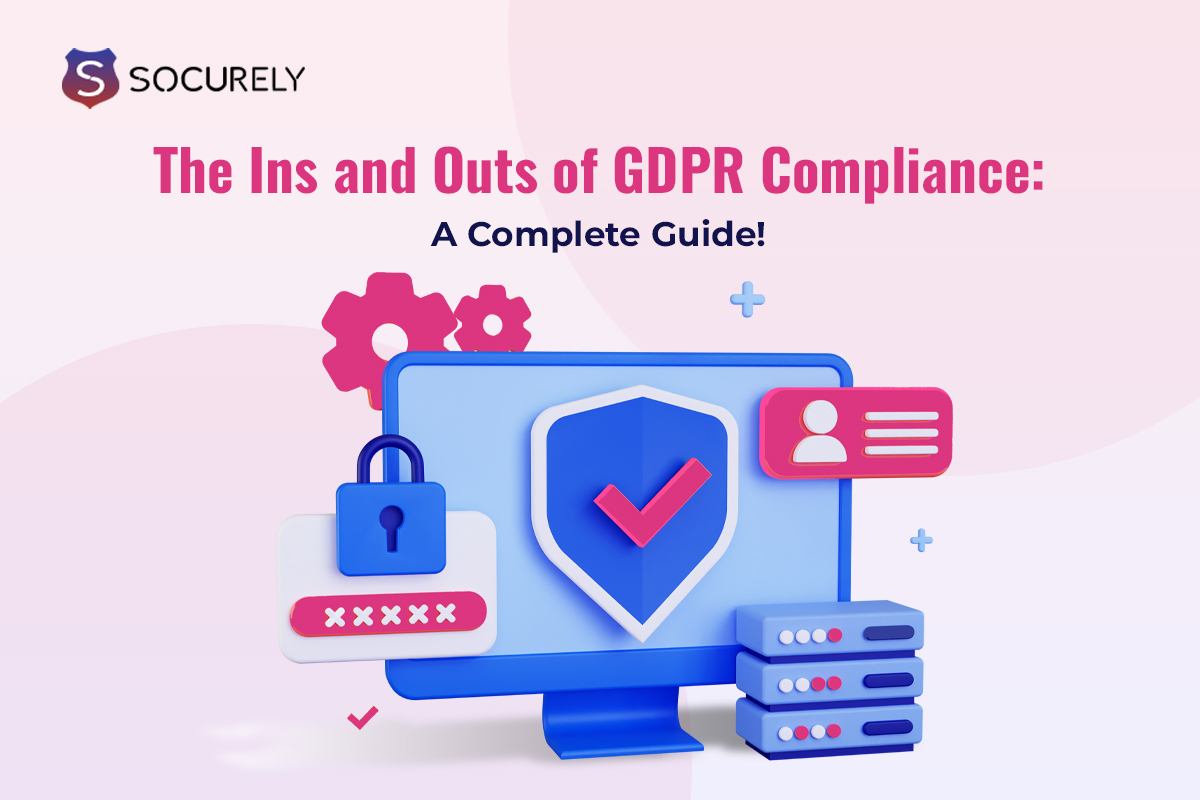The European Union’s new GDPR went into force in 2018, where performing online business became much more difficult. GDPR compliance is a crucial need in such a scenario, and failing to comply with it could result in severe penalties.
GDPR or General Data Protection Regulation is a European Union-enacted regulation that includes various fundamentals a business should follow.
What to understand the fundamentals of GDPR? Check out here- https://socurely.com/a-concise-overview-of-the-10-fundamental-gdpr-key-requirements/
GDPR applies to organizations that collect, process or store the personal data of individuals in the European Union (EU), including those in Canada. GDPR compliance is crucial for businesses to avoid hefty fines and maintain trust with their customers.
Do you have all the information you require for your GDPR Compliance in Canada? Discover the eight most important things you should know about GDPR.
How Effective Is GDPR Compliance For Your Business?
The European Union enacted the General Data Protection Regulation (GDPR) legislation in 2016, and it became fully operative in 2018. The General Data Protection Regulation (GDPR) is essentially a set of guidelines and rules that businesses operating in the European Union must abide by while collecting or handling user data. All EU citizens’ data security and privacy are intended to be safeguarded with the GDPR Compliance in Canada.
GDPR is highly effective for your business. It offers the major benefits like-
- Enhanced Data Security: GDPR compliance necessitates implementing robust data security measures, such as encryption and access controls, which can significantly reduce the risk of data breaches and cyberattacks.
- Improved Customer Trust: Demonstrating GDPR compliance can enhance customer trust and confidence in your business, as it shows your commitment to protecting their data and respecting their privacy rights.
- Advantage For Competitions- When dealing with customers who prioritize data privacy and security in their purchasing decisions, GDPR compliance can offer a competitive advantage.
- Streamlined Data Management: GDPR compliance requires businesses to adopt more transparent and efficient data management practices, which can lead to cost savings and improved operational efficiency.
- Global Reach: While GDPR is a European regulation, its impact is global. Compliance can help businesses establish a strong data protection framework that aligns with other international data protection laws, enhancing their ability to operate in a global marketplace.
Top Facts On GDPR Compliance In Canada:
The first step is to educate yourself on GDPR compliance to safeguard your customers’ rights and shield your company from the severe fines associated with non-compliance. Let’s start with these crucial details-
- GDPR Compliance Goes Beyond EU Businesses-
The idea that businesses are exempt from the GDPR simply because they feel that GDPR is limited in the EU, is not true and if considered, it is among the most harmful ones.
GDPR laws are based on the user, not the business. Put another way, you must abide by EU GDPR Compliance if you ever have users from the EU on your website and you collect or process their data. But for any global business following the GDPR Compliance is mandatory.
- GDPR Compliance Is Not Limited To EU nationals
Yes, EU people are protected by the GDPR, but they also protect others. Any cardholder conducting business within the EU is protected by GDPR. For example, when an American citizen visits France, their rights, privacy, and data handling must adhere to the GDPR during their stay.
- GDPR mainly Focuses On The “opt in” Paradigm
Until the GDPR, businesses could gather and use your data as they visit the website. Websites would offer an opt-out option, but unless you made a deliberate decision to opt-out, you were automatically opting in.
It is flipped by the GDPR compliance in Canada. Every person in the EU who visits a website is automatically “opted out” unless they specifically accept to be “opted in”. The GDPR presumes that you haven’t consented unless you explicitly state differently, as opposed to presuming that you have until you indicate otherwise.
- GDPR Specifies Online Users’ Fundamental Rights
When you consider GDPR compliance, you consider the actions that must be taken for your company to comply. However, it’s crucial to comprehend the fundamental principles of the law first, which are the rights that every EU citizen is entitled to.
The GDPR specifies eight human rights that users have in particular, like-
- The right to information: Before the collection, storage, or processing of their data, users are entitled to provide their informed consent.
- The right of access: Users are entitled to view the personal information that they own about them. They can inquire about the kind of data you gather, how it’s used, kept, and processed, and other details, and you have to respond to their inquiries very soon.
- The right to rectification: Users may ask that any of their data be updated, supplemented, or corrected.
- The right to erasure: Users who choose to withdraw their consent or who are no longer customers may request that you erase their data.
- The ability to restrict processing: Users have the right to request that you stop using their data or cease using it in a certain way.
- The right to data portability: Users have the option to move their gathered personal data to another service provider, but you have to be able to deliver it to them in a manner that is widely accepted.
- The right to object: Users can ask you to stop using or processing their data, and you are required to comply.
- The right to avoid automated decision-making: Users have the right to be free from automated decision-making processes, such as those that include profiling individuals for marketing purposes. If you employ automated decision-making, you have to abide by user requests for exemptions.
- The GDPR Governs Almost All Personal Data
Several restrictions pertain to different sorts of client data when conducting business online. For instance, HIPAA deals exclusively with protected health information, yet PCI DSS specifies guidelines for managing cardholder data. Conversely, GDPR is distinct in that it covers almost everything.
Any personal information, including name and date of birth, web data, payment information, political opinions, demographic data, health information, and more is covered by the GDPR. User-generated content, such as images uploaded by users, is also impacted.
- GDPR compliance for non-EU firms demands EU representation
To facilitate communication between companies and authorities, the EU mandates that each business adhering to GDPR designate a representative who is physically located in the EU (and vice versa). If you don’t have an employee or other representation in the EU, you can “hire” a representative through services for GDPR compliance in Canada or other non-EU nations.
- GDPR non-compliance has alarming effects
Every security standard has a different enforcement method, and many of them are just industry norms that build confidence with your partners. The General Data Protection Regulation (GDPR) is a legally mandated obligation that carries harsh penalties for noncompliance.
Penalties are based on a tiered structure based on the severity of your non-compliance.
You may be penalized up to 4% of your worldwide turnover or €20 million for the highest tier, whichever is higher.
- GDPR Compliance Cant Be Managed Single Handled
Any firm should familiarize itself with the fundamentals of the GDPR, but it might be daunting to think about complying with the regulations and keeping track of your compliance.
Thankfully, you don’t need to determine that for yourself. Automated tools exist that can examine your data security system and website to ensure that they meet all the necessary GDPR compliance standards. To expedite the process, you will receive a detailed list of the requirements that you have already satisfied and those that you still need to fulfill.
Some Other Important Facts On GDPR Compliance In Canada-
- Scope of GDPR: GDPR applies to all organizations, regardless of size or location, that process the personal data of individuals in the EU. This includes organizations in Canada that offer goods or services to EU residents or monitor their behavior.
- Data Protection Principles: GDPR is based on several principles, including the lawful, fair, and transparent processing of personal data; purpose limitation; data minimization; accuracy; storage limitation; integrity and confidentiality; and accountability.
- Data Breach Notification: GDPR requires organizations to notify the relevant supervisory authority of a data breach within 72 hours of becoming aware.
- Data Protection Officer (DPO): Some organizations are required to appoint a DPO to oversee GDPR compliance. The DPO should have expertise in data protection law and practices and should be independent in their role.
- International Data Transfers: GDPR restricts the transfer of personal data outside the EU to countries that do not provide an adequate level of data protection. Organizations can use standard contractual clauses or other approved mechanisms to ensure the protection of data.
- GDPR Compliance in Canada: In Canada, organizations that collect, use, or disclose personal information in the course of commercial activities are subject to the Personal Information Protection and Electronic Documents Act (PIPEDA). While PIPEDA and GDPR have some similarities, GDPR sets a higher standard for data protection.
- Penalties for Non-Compliance: Organizations that fail to comply with GDPR can face fines of up to €20 million or 4% of annual global turnover, whichever is higher.
Wrapping Up
GDPR compliance is crucial for businesses in Canada and globally to protect personal data, enhance data security, and maintain customer trust. Understanding the key requirements and implications of GDPR is essential for ensuring compliance and avoiding hefty fines. By implementing robust data protection measures, businesses can not only meet regulatory requirements but also gain a competitive edge in the market.







